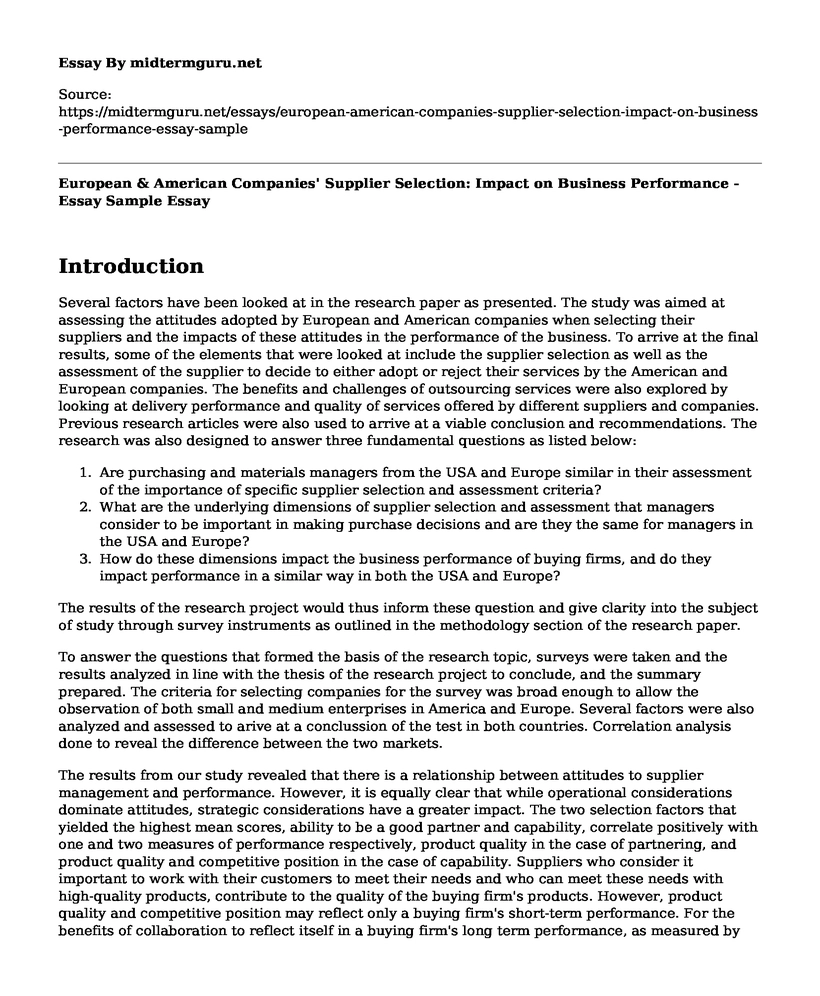Introduction
Several factors have been looked at in the research paper as presented. The study was aimed at assessing the attitudes adopted by European and American companies when selecting their suppliers and the impacts of these attitudes in the performance of the business. To arrive at the final results, some of the elements that were looked at include the supplier selection as well as the assessment of the supplier to decide to either adopt or reject their services by the American and European companies. The benefits and challenges of outsourcing services were also explored by looking at delivery performance and quality of services offered by different suppliers and companies. Previous research articles were also used to arrive at a viable conclusion and recommendations. The research was also designed to answer three fundamental questions as listed below:
- Are purchasing and materials managers from the USA and Europe similar in their assessment of the importance of specific supplier selection and assessment criteria?
- What are the underlying dimensions of supplier selection and assessment that managers consider to be important in making purchase decisions and are they the same for managers in the USA and Europe?
- How do these dimensions impact the business performance of buying firms, and do they impact performance in a similar way in both the USA and Europe?
The results of the research project would thus inform these question and give clarity into the subject of study through survey instruments as outlined in the methodology section of the research paper.
To answer the questions that formed the basis of the research topic, surveys were taken and the results analyzed in line with the thesis of the research project to conclude, and the summary prepared. The criteria for selecting companies for the survey was broad enough to allow the observation of both small and medium enterprises in America and Europe. Several factors were also analyzed and assessed to arive at a conclussion of the test in both countries. Correlation analysis done to reveal the difference between the two markets.
The results from our study revealed that there is a relationship between attitudes to supplier management and performance. However, it is equally clear that while operational considerations dominate attitudes, strategic considerations have a greater impact. The two selection factors that yielded the highest mean scores, ability to be a good partner and capability, correlate positively with one and two measures of performance respectively, product quality in the case of partnering, and product quality and competitive position in the case of capability. Suppliers who consider it important to work with their customers to meet their needs and who can meet these needs with high-quality products, contribute to the quality of the buying firm's products. However, product quality and competitive position may reflect only a buying firm's short-term performance. For the benefits of collaboration to reflect itself in a buying firm's long term performance, as measured by return on assets and market share, a greater, strategic commitment to the customer is required from the supplier. Also, it requires a willingness on the part of the supplier to open itself up to the customer, and an established record as a supplier of integrity. It also revealed that while delivery and service quality impact product quality and the ability of the buying firm to meet the expectations of its customers, long-term success requires suppliers willing to respond to its customers changing needs. More importantly, it requires close cooperation, and by implication, significant information flow, between the buying firm and its suppliers.
The reason why attitudes towards supplier management have a more limited impact on the performance of European firms is not clear. One can speculate on several possible reasons. The more fragmented European market may make it more difficult for European respondents to make judgments regarding relative performance than American respondents. It may also make it more difficult to establish the supply chain relationships that enhance performance. The results raise important issues regarding the distinction between "hard" and "soft" supplier selection criteria. While the evidence suggests that for both American and European firms "hard" selection, and for that matter assessment criteria, are viewed as being more important, it is clear that attitudes towards "soft" criteria have, at least for American firms, broader impact. Moreover, although Ellram (1991) showed that "soft" criteria are important in the context of strategic buyer/supplier partnerships, the results here suggest they can have an impact on the buying firm's performance regardless of whether the buyer/supplier relationship is strategic.
Conclusion
All the results obtained pointed towards one conclusion, that To the extent that they place comparable levels of importance on various supplier selection and assessment tactics, American and European firms are similar in their attitudes to supply management. The results suggest the need for organizations to re-examine their objectives in procurement planning. Strategic alignment with suppliers not only directly impacts performance as suggested by the results but also does so indirectly.
Cite this page
European & American Companies' Supplier Selection: Impact on Business Performance - Essay Sample. (2022, Dec 26). Retrieved from https://midtermguru.com/essays/european-american-companies-supplier-selection-impact-on-business-performance-essay-sample
If you are the original author of this essay and no longer wish to have it published on the midtermguru.com website, please click below to request its removal:
- Analysis of Apple Inc Company - Paper Example
- Analysis of Experts Company - Paper Example
- Evaluation Paper on KYLOD Company
- Essay Sample on Fire Fighters: Line of Duty Death
- Communicating With Your Manager - Essay Sample
- Unlock Business Success With the Baldrige Principle - Essay Sample
- Making Professional Partnerships Work: Communication & Decision Making - Research Paper







